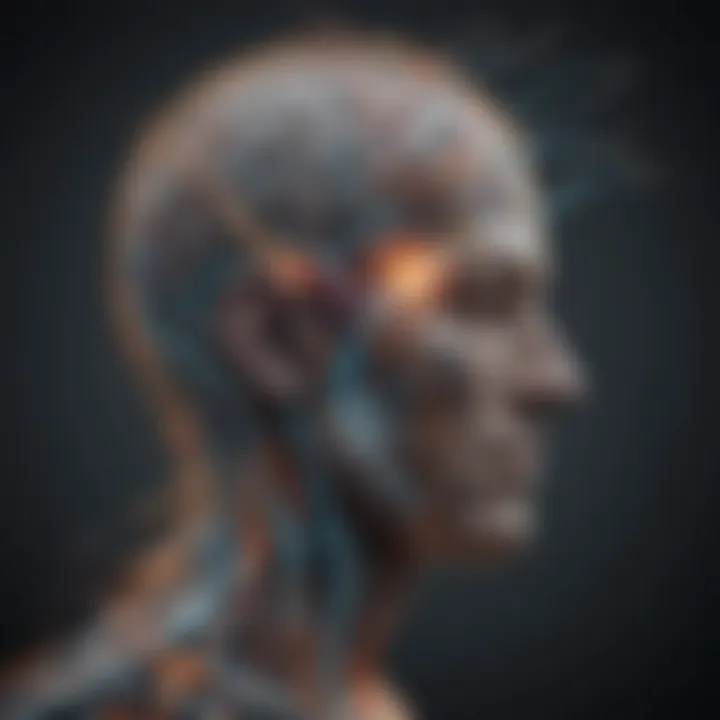The Role of Serotonin in Depression and Mental Health


Intro
Understanding the connection between serotonin and depression is crucial for advancing mental health treatment. Serotonin is a neurotransmitter that affects mood, cognition, and emotional regulation. Research indicates that imbalances in serotonin levels can contribute to the onset and persistence of depressive disorders. This article delves into the chemical pathways, therapeutic implications, and lifestyle factors that influence serotonin regulation.
Key Research Findings
Overview of Recent Discoveries
Recent studies highlight the complexity of serotonin's role in mental health. For instance, a study published in Biological Psychiatry suggests that serotonin does not merely correlate with mood but actively shapes emotional responses. Furthermore, research by the National Institute of Mental Health shows the effect of serotonin on neural pathways that are critical for emotional stability.
Significance of Findings in the Field
These findings have significant implications for treatments aimed at alleviating depression. They suggest that supplements, such as 5-HTP, could potentially enhance serotonin production. Moreover, SSRIs (selective serotonin reuptake inhibitors), which are commonly prescribed, target serotonin reuptake mechanisms to increase its availability in the brain. Understanding these processes can lead to more tailored therapeutic approaches for individuals suffering from depression.
Breakdown of Complex Concepts
Simplification of Advanced Theories
To appreciate serotonin's role, one must first understand how it functions within the brain. Serotonin is synthesized from tryptophan, an amino acid. Once produced, it influences a variety of functions, including mood, sleep, and appetite. Medication and therapy often aim to stabilize serotonin levels to improve conditions like depression.
Visual Aids and Infographics
Visual aids can help demystify the relationship between serotonin and mood disorders. Infographics detailing the biochemical pathways of serotonin can serve as valuable resources for both students and professionals. Understanding the neurobiological aspects contributes significantly to grasping how this neurotransmitter impacts emotional well-being.
"Research continuously demonstrates the intricate relationship between serotonin levels and mental health, paving the way for innovative treatment strategies."
By connecting biochemical pathways with mental health outcomes, we open avenues for further exploration and understanding of depression treatment. The integration of lifestyle changes and mindfulness practices may also enhance serotonin production, offering a holistic approach to managing this mental health condition.
Prelims to Serotonin and Depression
Understanding serotonin and its role in depression is a fundamental aspect of mental health research. Serotonin, a neurotransmitter, plays a significant role in regulating mood, emotion, and overall mental well-being. By examining how serotonin functions within the brain, we can gain insight into the complexities of mood disorders such as depression. This section will delve into the essential elements that define serotonin, provide an overview of depression, and highlight the crucial link between serotonin levels and mood disorders.
Defining Serotonin
Serotonin, known scientifically as 5-hydroxytryptamine (5-HT), is primarily located in the brain, intestines, and blood platelets. It is synthesized from the amino acid tryptophan through a series of biochemical reactions involving enzymes. In the brain, serotonin acts as a neurotransmitter, transmitting signals between nerve cells. It influences various functions, including mood, appetite, sleep, and cognition. Its widespread effects underscore its importance in maintaining emotional balance. Abnormal serotonin levels are often linked to several psychiatric disorders, including depression, anxiety, and schizophrenia.
Understanding Depression
Depression is more than just feeling sad. It is a complex mental health condition characterized by persistent feelings of sadness, hopelessness, and a loss of interest in daily activities. Various factors contribute to its onset, including genetic predisposition, environmental triggers, and neurobiological imbalances. Unlike transient feelings of sadness, clinical depression can lead to significant impairment in an individual's ability to function in daily life. Symptoms can include fatigue, sleep disturbances, appetite changes, and difficulty concentrating.
The Connection Between Serotonin and Mood Disorders
The relationship between serotonin and mood disorders has been the subject of extensive research. Low serotonin levels are correlated with depressive symptoms and other mood disorders. This connection has influenced the development of various antidepressant medications, particularly selective serotonin reuptake inhibitors (SSRIs), which aim to increase serotonin availability in the brain. Despite this link, debates persist regarding the efficacy of serotonin depletion as the sole explanation for depression. Advances in neurobiology continue to explore how other neurotransmitters and psychological factors interplay with serotonin in influencing mood, highlighting the complexity of mental health conditions and the necessity for a multifaceted approach to treatment.
"Recent studies suggest that serotonin is only one piece of a much larger puzzle, involving multiple neurochemical systems and psychological factors."
Through these explorations, we aim to connect the dots between serotonin and depression, fostering a deeper understanding of mental health that can inform treatment paths.
Serotonin's Biochemical Role
The biochemical role of serotonin is crucial in understanding not just its direct impact on depression, but also the broader complexities of mental health. Serotonin, a neurotransmitter, serves multiple functions in the brain and body. This section delves into the aspects that underpin its significance, focusing on synthesis, interactions with hormones, and receptor functions.
Serotonin Synthesis and Function
Serotonin synthesis begins with the amino acid tryptophan. This process involves a series of enzymatic reactions that convert tryptophan into serotonin. Tryptophan is primarily found in protein-rich foods such as turkey, eggs, and nuts. Once synthesized, serotonin fulfills various functions, acting not only within the brain but also throughout the body.
In the central nervous system, serotonin influences mood, emotion, and behavior. Low levels of serotonin are often correlated with depressive symptoms. The relationship between serotonin and mood disorders has led to the exploration of treatments like selective serotonin reuptake inhibitors (SSRIs), which aim to increase serotonin availability in the synaptic cleft.
Neurotransmitter and Hormonal Interactions
Serotonin does not act in isolation. It interacts with several hormones and other neurotransmitters, thereby impacting overall mental health. For example, serotonin plays a role in regulating the release of cortisol, a hormone related to stress. High stress levels can inhibit serotonin production, creating a cycle that exacerbates depressive symptoms.
Other neurotransmitters such as dopamine and norepinephrine also interact with serotonin pathways. These interactions can lead to varying mental health outcomes, depending on an individual’s biochemical makeup. Understanding these relationships is vital for developing targeted treatments that address the intricacies of depression.


Serotonin Receptors and Their Importance
Serotonin operates through various receptors, with at least 14 distinct subtypes identified. Each receptor subtype has a unique role in different physiological and psychological processes. For example, the 5-HT1A receptor is significant for anxiety and depression regulation, while the 5-HT2A receptors are linked to mood and cognition.
The density and distribution of serotonin receptors can also vary across individuals. This variation can influence how one responds to treatments aimed at modifying serotonin levels. Thus, understanding the specific roles of these receptors deepens our grasp of potential therapeutic strategies.
"Mapping the complexities of serotonin's role in the body is essential to addressing how its dysregulation contributes to mood disorders."
In summary, comprehending serotonin's biochemical role involves examining its synthesis, its interaction with hormones and other neurotransmitters, and its functioning through various receptor subtypes. This knowledge sets the stage for both understanding depression and exploring effective treatment options for those impacted by this mental health challenge.
Symptoms and Diagnosis of Depression
Understanding the symptoms and diagnosis of depression is crucial to addressing this mental health condition. Early identification allows for effective intervention, leading to better outcomes for patients. Additionally, accurate diagnosis helps differentiate depression from other disorders, ensuring appropriate treatment options. This section will delve into the clinical manifestations of depression, the tools used for diagnosis, and the importance of excluding other potential conditions.
Clinical Manifestations of Depression
The clinical manifestations of depression vary widely among individuals. While some experience persistent sadness, others may present with irritability or a lack of interest in activities once enjoyed. Symptoms can include:
- Emotional symptoms: These may encompass feelings of hopelessness, guilt, or worthlessness. Individuals might express emotional pain that feels all-consuming.
- Cognitive symptoms: Poor concentration, indecisiveness, and memory issues often accompany depression. These cognitive impairments can hinder daily functioning, creating a vicious cycle where low spirits exacerbate cognitive decline.
- Physical symptoms: Depression can present physically as fatigue, changes in appetite or weight, and sleep disturbances. Many people complain of unexplained aches and pains that resist typical treatment.
The interplay of these symptoms contributes to the overall burden of depression, affecting personal and professional aspects of life. Being aware of these manifestations can help individuals and healthcare providers recognize the condition.
Tools for Diagnosis
Diagnosing depression can be complex, as it relies on both subjective and objective assessments. Several tools assist clinicians in reaching an accurate diagnosis:
- Clinical interviews: Structured or semi-structured interviews help gather detailed information about an individual's symptoms, personal history, and family history of mental health issues.
- Clinical Rating Scales: Scales such as the Hamilton Rating Scale for Depression (HAM-D) and Beck Depression Inventory (BDI) provide standardized measures to assess the severity of symptoms.
- Diagnostic Criteria: The Diagnostic and Statistical Manual of Mental Disorders (DSM-5) outlines standardized criteria for diagnosing depressive disorders, guiding practitioners in their assessments.
Utilizing these diagnostic tools ensures that healthcare providers can identify depression accurately and initiate appropriate treatment.
Differential Diagnosis: Excluding Other Conditions
Diagnosis of depression requires careful consideration of other possible conditions. Various disorders can mimic depressive symptoms, complicating the diagnostic process. Among these conditions are:
- Anxiety Disorders: Anxiety often overlaps with depression, as both may involve similar emotional and physical symptoms. Differentiating between these is crucial for targeted treatment.
- Substance Use Disorders: Drug and alcohol use can culminate in mood changes similar to those seen in depression. A thorough assessment helps distinguish between substance-induced mood disorders and primary depression.
- Medical Conditions: Certain health issues, like hypothyroidism or chronic illnesses, may present depressive symptoms, requiring medical evaluation to exclude underlying physical causes.
Ultimately, a comprehensive evaluation is vital for ensuring a correct diagnosis, leading to effective treatment strategies. Recognizing depression among its many peaks allows for timely and suitable interventions, which can significantly enhance an individual’s quality of life.
"The diagnosis of depression should be approached systematically to differentiate it from other mood disorders, which can be easily misidentified."
Research on Serotonin's Role in Depression
The investigation into the relationship between serotonin and depression is vital for grasping the biological underpinnings of mood disorders. As serotonin is a key neurotransmitter, understanding its role can lead to more effective treatments and better patient outcomes. Researchers have engaged in various studies to determine how alterations in serotonin levels affect mood, behavior, and overall mental health. This focus on serotonin not only informs pharmacological approaches but also guides behavioral and lifestyle interventions.
Studies Highlighting Serotonin Deficiency
Many studies point to a correlation between serotonin deficiency and depression. One prominent piece of research discovered that individuals with severe depression often exhibit lower levels of serotonin metabolites in their cerebrospinal fluid. These findings suggest a link between serotonin availability and mood stabilization. Furthermore, studies involving postmortem brain tissue have shown that depressed individuals tend to have fewer serotonin receptors.
Another significant examination published in the journal "Archives of General Psychiatry" revealed that patients with Major Depressive Disorder displayed marked improvements in mood following treatment with selective serotonin reuptake inhibitors (SSRIs). This underscores the hypothesis that low serotonin levels may contribute to depressive symptoms, making it a target for therapeutic intervention.
Contrasting Views on Serotonin Theory
Despite the prominence of serotonin theory, there remains a debate surrounding its sufficiency in explaining depression's complexities. Critics argue that the serotonin deficiency hypothesis oversimplifies the disorder. Research indicates that depression is multifactorial, influenced by genetics, environment, and psychological factors alongside neurotransmitter levels.
A study published in "The American Journal of Psychiatry" points out that while serotonin may play a role in mood regulation, it is not the sole factor. Individuals with normal serotonin levels can still experience depression, indicating that other neurotransmitters, like dopamine and norepinephrine, can also influence mood and emotional well-being. This insight emphasizes the necessity for a broader understanding of depression's etiology, considering various biological systems and their interactions.
Recent Advances in Neurobiology
Recent advancements in neurobiology have shed light on how serotonin functions within the brain and its implications for depression. Neuroimaging technologies, such as PET scans, have allowed scientists to visualize serotonin receptors and measure serotonin transport in real-time, providing deeper insights.
Moreover, studies revealing the neuroplastic effects of serotonin have become integral to understanding its role in depression. Research has indicated that serotonin promotes neurogenesis and synaptic plasticity, which are essential for cognitive function and emotional regulation. The regulation of these processes may explain why individuals with chronic depression often endure cognitive impairments.
Continued exploration into serotonin's role in neural pathways illuminates potential target points for new treatment development. Innovations in gene therapy, personalized medicine, and even novel pharmacological agents are emerging possibilities. By engaging with these findings, researchers are advancing toward more comprehensive strategies for managing depression effectively.
The intricate relation between serotonin and depression reflects a complex interplay of biochemical and experiential factors, demanding a multifaceted approach to treatment.


Understanding serotonin's multifarious role in mood disorders remains a foundational focus within psychobiological research. Building on earlier studies is crucial for evolving our therapeutic techniques and enhancing the quality of life for those affected by depression.
Implications for Treatment
Understanding the implications for treatment in the context of serotonin and depression is crucial for developing effective therapeutic strategies. This area encompasses various methodologies, including pharmacological and non-pharmacological approaches. Recognizing how serotonin influences mood can guide the choice of treatment options available for those diagnosed with depression. Daily living and mental health recovery may significantly improve by integrating lifestyle factors, such as nutrition and exercise, alongside medication.
Antidepressants and Serotonin Reuptake Inhibitors
Antidepressants often target serotonergic pathways to alleviate depressive symptoms. Two primary classes are selective serotonin reuptake inhibitors (SSRIs) and serotonin-norepinephrine reuptake inhibitors (SNRIs). SSRIs, like fluoxetine and sertraline, work by increasing serotonin levels in the synaptic cleft. This increase works to enhance mood in patients by boosting the overall serotonergic activity in the brain.
Benefits of SSRIs and SNRIs include:
- Improved mood and emotional regulation
- Reduced anxiety symptoms
- Generally favorable side effect profiles
However, one should consider potential challenges, including delayed onset of effects and the possibility of withdrawal symptoms upon discontinuation. Each patient's response to these medications may vary significantly, highlighting the need for personalized treatment approaches.
Alternative Therapeutic Approaches
Aside from pharmacological treatments, several alternative therapeutic strategies can enhance serotonin levels and improve mental well-being. These approaches do not exclude medications but complement them effectively. Some alternatives include:
- Psychotherapy: Cognitive Behavioral Therapy (CBT) can target negative thought patterns and behaviors, improving emotional regulation.
- Mindfulness techniques: Practices, such as meditation and yoga, help reduce stress and enhance overall mood by improving mindfulness and presence.
- Nutrition: Consuming foods rich in omega-3 fatty acids and the amino acid tryptophan can also support serotonin production. Foods such as salmon, walnuts, and eggs are beneficial.
While these alternative approaches may not replace conventional treatments, they offer valuable support for individuals on their journey to recovery.
Future Directions in Treatment Research
As research into serotonin and depression evolves, new potential treatment avenues are emerging. Some active areas of investigation include the influence of the gut-brain axis on serotonin production and the role of the microbiome in mood regulation. These research pathways suggest a more holistic view of mental health where dietary and lifestyle changes can play key roles.
Additionally, ongoing studies are exploring the efficacy of combination therapies, integrating both traditional medications and alternative therapies for a more well-rounded approach to treatment. Personalized medicine also promises to tailor treatments based on genetic predispositions to better meet indivudual needs in managing depression.
The future of treatment research holds great promise for developing comprehensive strategies that incorporate various therapeutic modalities and personalized care options.
Lifestyle Factors Affecting Serotonin Levels
Understanding the lifestyle factors that affect serotonin levels is vital in the discussion of depression. Serotonin plays a crucial role in mood regulation, so any changes in its levels can have direct implications for mental well-being. The interaction between these elements is complex and multifaceted. Therefore, it is important to recognize how diet, exercise, and sleep patterns can either enhance or hinder serotonin production and receptor function.
Diet and Nutrition
Nutrition directly influences serotonin levels. The amino acid tryptophan is a precursor for serotonin synthesis. Foods rich in this amino acid should be integrated into diets for better mental health. Examples include turkey, eggs, cheese, and nuts. However, it's not just tryptophan that matters. The overall nutritional quality of one's diet plays an essential role. A balanced diet, high in fruits, vegetables, whole grains, and healthy fats, supports brain health and neurotransmitter function.
Here are some important considerations related to diet and nutrition:
- Complex Carbohydrates: Foods like oatmeal and brown rice can help in transporting tryptophan across the blood-brain barrier.
- Omega-3 Fatty Acids: Found in fish like salmon and sardines, these fats promote serotonin receptor function.
- Hydration: Dehydration can negatively affect mood, so maintaining proper fluid intake is vital.
Exercise and Its Effects
Physical activity is another critical factor in regulating serotonin levels. Engaging in regular exercise can enhance serotonin production, essentially acting as a natural antidepressant. Studies suggest that aerobic exercises, such as running or cycling, can significantly boost serotonin release in the brain. Exercise also elevates endorphin levels, further improving mood.
Consider these points regarding exercise:
- Duration Matters: Even short bursts of exercise can positively impact serotonin levels. Consider a daily walk or jog for noticeable effects.
- Social Interaction: Group exercise can also provide social support, which additionally bolsters serotonin levels.
- Stress Reduction: Physical activity can lower stress hormones, which may otherwise inhibit serotonin production.
Sleep Patterns and Mood Regulation
Sleep patterns are intimately linked to serotonin levels. During sleep, serotonin is converted into melatonin, the hormone regulating sleep cycles. Disruptions in sleep can lead to imbalances in serotonin levels, which may trigger or exacerbate depressive symptoms.
Key aspects to consider include:
- Quality of Sleep: Prioritizing good sleep hygiene—such as establishing regular sleep hours and creating a calming bedtime routine—can improve serotonin levels.
- Impact of Sleep Disorders: Conditions like insomnia or sleep apnea can severely affect mood and are associated with lower serotonin levels.
- Circadian Rhythms: A regular cycle of light and dark exposure helps balance serotonin production, which is essential for overall mood stabilization.
"Serotonin levels are not only modulated by biochemical factors but also significantly influenced by lifestyle choices."
In summary, lifestyle factors play a crucial role in the modulation of serotonin levels. By taking a comprehensive approach, individuals can improve their biochemical pathways associated with mood regulation. This insight can be transformative in understanding and managing depression effectively.
The Role of Genetics in Depression


Understanding the role of genetics in depression is critical in delving into the complexities of mood disorders. Genetic factors contribute to the biological underpinnings of depression, and recognizing these elements helps in formulating more effective treatment strategies. Research suggests that family history can play a significant role in individual susceptibility to depression. This section focuses on two main aspects: the heritability of serotonin transport, and the broader genetic predispositions that influence depressive disorders.
Heritability of Serotonin Transport
Serotonin transport is a vital process that regulates serotonin levels in the brain. It is facilitated by the serotonin transporter, a protein that helps in reabsorbing serotonin from the synaptic cleft after neurotransmission. Variations in the genes coding for the serotonin transporter can significantly impact how serotonin functions in the brain. Studies have identified specific polymorphisms, such as the 5-HTTLPR, linked to an increased risk of developing depression in response to environmental stressors.
- Individuals with the short variant of the 5-HTTLPR gene may have a less efficient serotonin transport system. This inefficiency can lead to lower serotonin levels, correlating with depressive symptoms.
- Conversely, those with the long variant generally seem to have a more robust serotonin regulation, which may mitigate the risk of developing depressive disorders.
Serotonin transport heritability emphasizes the need for genetic considerations in the diagnosis and treatment of depression. Understanding an individual’s genetic makeup provides valuable insights, paving the way for personalized therapeutic approaches.
Genetic Predispositions to Depression
Genetic predispositions account for a significant portion of the risk of developing depression. Multiple genes are involved, and their interactions can influence neurotransmitter systems, including serotonin. Notably, genetic factors do not act in isolation; they often interplay with environmental influences, leading to complex outcomes.
Research findings indicate that:
- Family Studies: They consistently show that individuals with a family history of depression are at a higher risk of experiencing depressive episodes themselves.
- Twin Studies: These studies have estimated the heritability of major depressive disorder to be around 37%, supporting a genetic influence in the condition.
- Association Studies: Certain alleles associated with neurotransmitter systems have been linked to higher susceptibility to depression.
Understanding these genetic predispositions can aid healthcare professionals in identifying at-risk individuals. It can also direct research towards developing new treatments, considering genetic factors as mean to customize therapeutic options.
"Genetics might explain why one individual develops depression while another does not, despite similar life circumstances."
The exploration of genetics in depression underscores the intricate relationship between biology and mental health. Moving forward, addressing the genetic components will be crucial in the fight against depression, combining traditional therapeutic approaches with insights gained from genetic research.
Integrative Approaches to Managing Depression
Integrative approaches to managing depression are essential for comprehensive mental health care. These methods explore various avenues beyond just pharmacological treatments, capturing the complexity of human experience. They encompass a range of strategies, including psychological therapies, wellness practices, and social support systems. Understanding these elements can help individuals achieve greater emotional stability and improve overall well-being.
Cognitive Behavioral Therapy
Cognitive Behavioral Therapy (CBT) is one of the most recognized and effective treatment modalities for depression. This therapeutic approach is based on the premise that negative thought patterns contribute to emotional distress. CBT helps individuals identify and reframe these harmful beliefs.
By emphasizing the relationship between thoughts, feelings, and behaviors, patients gain tools to challenge their cognitive distortions.
Research has shown that CBT can significantly reduce depressive symptoms. The skills learned in CBT are not just temporary solutions; they foster long-term resilience against future episodes of depression. Consistent engagement in CBT can lead to a better understanding of oneself, fostering a positive feedback loop of self-awareness and emotional health.
Mindfulness and Its Benefits
Mindfulness practices offer another valuable component in managing depression. This approach involves cultivating present-moment awareness. Mindfulness allows individuals to observe their thoughts and feelings without judgment.
Studies have demonstrated that mindfulness can improve emotional regulation, reduce feelings of anxiety, and enhance overall well-being. Techniques like meditation, deep breathing exercises, and yoga can significantly increase serotonin levels, thus positively impacting mood.
The benefits of mindfulness extend beyond immediate mood improvement. Regular mindfulness practice may alter the brain's structure and function over time, promoting emotional resilience. It encourages a more accepting attitude towards one’s thoughts and feelings, allowing for a healthier response to stressors in daily life.
Support Systems and Their Importance
The role of support systems in managing depression cannot be overlooked. Social support plays a crucial role in emotional recovery and resilience. Having a reliable network, including family, friends, or support groups, offers individuals a sense of belonging and helps combat feelings of isolation.
Research indicates that individuals with strong social connections have better mental health outcomes. Support systems provide a space for sharing experiences, reducing stigma, and fostering understanding among individuals. The encouragement from others can boost motivation and adherence to treatment plans.
"Social support can be the lifeline that allows individuals to navigate the challenges of depression. Its impact on recovery is profound and should be prioritized in integrative treatment plans."
Culmination
The conclusion of this article serves as a critical summary of the role serotonin plays in depression. This section emphasizes the need to recognize serotonin not just as a chemical in the brain, but as a fundamental factor influencing mood and emotional states. By understanding its role, we can appreciate why it has become a focal point in both research and treatment approaches.
Recapitulating Key Insights
This article has discussed several essential aspects regarding serotonin and its connection to depression:
- Biochemical Mechanisms: It has been established that serotonin synthesis, release, and receptor interaction are pivotal in maintaining mood regulation. An imbalance in these systems often correlates with depressive symptoms.
- Research Findings: Numerous studies highlight the association between low serotonin levels and heightened severity of depression.
- Treatment Implications: A variety of treatment modalities, especially selective serotonin reuptake inhibitors, aim to correct serotonin deficiency, signaling a shift in therapeutic attitudes.
In brief, the intricate relationship between serotonin and depression underscores the necessity for ongoing research in this area. By elucidating these connections, we pave the way for enhanced therapeutic strategies and better outcomes for those affected by depression.
Future Research Directions
The evolving landscape of depression research opens several avenues for future exploration:
- Genetic Factors: Investigating how genetic predispositions affect serotonin transport could unveil specific populations that might benefit more from serotonin-targeting therapies.
- Longitudinal Studies: Conducting long-term studies could help us understand the dynamics of serotonin fluctuations over time in relation to mood disorders.
- Holistic Approaches: Further research into lifestyle factors, such as exercise and diet, alongside serotonin mechanisms, can lead to integrative treatment methodologies that address both biological and behavioral components of depression.
"Understanding serotonin's role sheds light on numerous treatment pathways, making it a critical focus for future studies in mental health."
In summary, the conclusion summarizes the insights gained, while also leaving the door open for further inquiry into the biochemical, genetic, and lifestyle interactions that influence serotonin levels and their potential impact on depression. The journey toward a more comprehensive understanding of depression is ongoing and necessitates adaptive and multifaceted research approaches.















